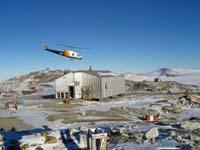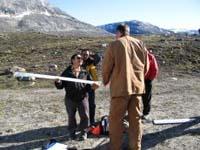FOX-C (Ekalugad Fiord) Remediation Project

FOX-C is located on the east coast of Baffin Island, approximately 240 kilometres north of Qikiqtarjuaq and 260 kilometres south of Clyde River.
Contaminant of Concern
The primary concern at FOX-C is Polychlorinated Biphenyls (PCB) materials. The PCBs are in the building paints, the buildings and site litter. The soil is also contaminated with hydrocarbons and heavy metals.
History of Site
FOX-C is a former Distant Early Warning (DEW) Line Site that was constructed in 1957 and then closed and abandoned in 1963. The site has not been formally occupied since that time. Throughout the 1980's and 1990's there were site assessments and work done to address the contaminants at the site. The site was identified as a priority site for clean-up under the Federal Contaminated Sites Accelerated Action Plan in 2003.
Indian and Northern Affairs Canada (INAC) completed the last phase of an assessment program in 2004. Work included a review of all previous assessment and cleanup activities, field investigations, barrel collection, computer modeling, development of engineering plans, and obtaining regulatory approvals. As part of this process, community consultations were undertaken in Qikiqtarjuaq and Clyde River and representatives from these areas were flown out the site.
Current Activity

To maximize the opportunities of this project for Inuit and Northern firms, an orientation session on how to do business with the Government of Canada was held in Iqaluit. As a result, Inuit owned, Qikiqtaaluk Corporation secured the $4.9 million camp construction contract, the $12 million remediation contract, and guaranteed an Inuit employment rate of 88 per cent.
In the summer of 2005, the project received regulatory approvals and equipment and materials were shipped to Ekalugad Fiord. Qikiqtani Inuit Association (QIA) representatives were flown to the site for consultation on future plans.
INAC plans to hold a community consultation meeting in Qikiqtarjuaq and Clyde River to keep residents informed of the contractor's cleanup plans and to hear community concerns. Cleanup is scheduled to begin in the summer of 2006.
Economic Benefits
In 2004, there were community consultation in both Qikiqtarjuaq and Clyde River. The communities benefited from the usage of local facilities and services. During the 2004 field program, local residents were able to gain employment and training in a number of areas such as sharing local knowledge, translation services, guide services, camp construction, carpentry, and equipment operation.
INAC continued its commitment in providing opportunities for Nunavummiut in its contractors' selection process. In 2005, the camp construction work was open only to firms that are Aboriginal owned. The bid evaluation process for the reclamation work gave extra points to proposals demonstrating a commitment toward the provisions of the Nunavut Land Claims Agreement.